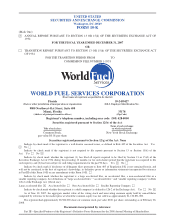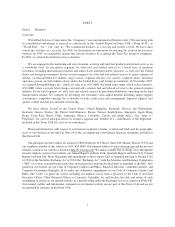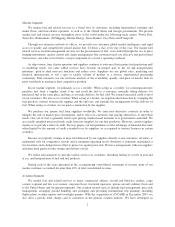World Fuel Services 2007 Annual Report Download - page 11
Download and view the complete annual report
Please find page 11 of the 2007 World Fuel Services annual report below. You can navigate through the pages in the report by either clicking on the pages listed below, or by using the keyword search tool below to find specific information within the annual report.
ˆ1KGX9SH6V90YFRW#Š
1KGX9SH6V90YFRW
64435 TX 3WORLD FUEL SERVICES
ANNUAL REPORT
28-Feb-2008 16:23 EST
CLN PSTAM
RR Donnelley ProFile SER lowel0da 5*
PMT 2C
TX8724AC350840
9.9.26
extensive network that enables us to provide aviation fuel and related services throughout most of the world
under the following trade names: World Fuel, PetroServicios de Mexico, Tramp Oil, PetroServicios de Costa
Rica, Baseops, Airdata and AVCARD.
In general, the aviation industry is capital intensive and highly leveraged. Recognizing the financial risks of
the airline industry, fuel suppliers generally refrain from extending unsecured lines of credit to airlines and avoid
doing business with certain airlines directly. Consequently, most carriers are required to post a cash collateralized
letter of credit or prepay for fuel purchases. This negatively impacts the airlines’ working capital. We recognize
that the extension of credit is a risk, but believe it is also a significant area of opportunity. Accordingly, we
extend unsecured credit to most of our customers.
We purchase our aviation fuel from suppliers worldwide. Our cost of fuel is generally tied to market-based
formulas or is government controlled. We are usually extended unsecured trade credit from our suppliers for our
fuel purchases. However, certain suppliers require us to provide a letter of credit. We may prepay our fuel
purchases to take advantage of financial discounts when limited by the amount of credit extended to us by
suppliers, or as required to transact business in certain countries. We also enter into derivative contracts in order
to mitigate the risk of market price fluctuations and to offer our customers fuel pricing alternatives to meet their
needs.
Fuel is typically delivered into our customers’ aircraft or designated storage directly from our suppliers or
from our fuel inventory. Inventory is held at multiple locations for competitive reasons, but we try to keep
inventory levels at an operating minimum. Inventory is purchased at airport locations or shipped via pipelines.
Inventory in pipelines is hedged in an effort to protect us against price risk. We have arrangements with our
suppliers and other third parties for the storage and delivery of fuel. We engage in spot sales and contract sales.
Spot sales are sales that do not involve continuing contractual obligations by our customers to purchase fuel from
us, whereas contract sales are made pursuant to fuel purchase contracts with our customers who commit to
purchasing specific volumes of fuel from us during the contract term.
We utilize subcontractors to provide various services to customers, including into-plane fueling at airports
and transportation and storage of fuel and fuel products.
During each of the years presented in the accompanying consolidated statements of income, none of our
aviation customers accounted for more than 10% of total consolidated revenue.
Land Segment
We market fuel and related services to petroleum distributors operating in the land transportation market.
Our land related services include management services for the procurement of fuel, price risk management and
financing. Most of our business is generated from our offices in California, Texas and Florida, which provide the
appropriate network to enable us to provide land fuel and related services throughout most of the United States.
We also have operations in Brazil and the United Kingdom.
In our land segment, we act as a reseller. When acting as a reseller, we contemporaneously purchase fuel
from a supplier, mark it up and resell it to our customers through rack spot sales and contract sales. We primarily
purchase our land fuel from suppliers throughout the United States. Our suppliers typically extend us unsecured
trade credit for our fuel purchases. Our cost of fuel is generally tied to market-based formulas. We extend
unsecured credit to most of our customers and offer them fuel-pricing alternatives through our price risk
management services.
Fuel is typically delivered to our customers directly at designated tanker truck loading terminals commonly
referred to as “racks.” These racks are owned and operated by our suppliers or third-party consortiums. We do
not hold any inventory. We engage in rack spot sales and contract sales and supply derivative contracts. Rack
spot sales are sales that do not involve continuing contractual obligations by our customers to purchase fuel from
3
























